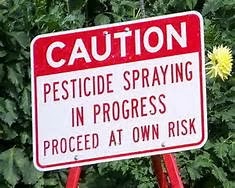These days it’s almost inevitable to come across news
stories about Genetically Modified Organisms (GMOs). This controversial
topic has made it into the mainstream media and many of us are unsure of what
to believe these days.
So what exactly
is a GMO? By definition, a GMO is a plan or animal that has been genetically engineered
with DNA from bacteria, viruses or other plants and animals.
GMOs boast the ability to –
- Resist viruses, fungi and bacterial growth
- Grow faster than their counterparts
- Are naturally pest resistant
- Tolerate extreme weather conditions
- Have added vitamins and minerals
This all sounds great, right? So why is this subject so controversial? Let's debunk some of the misconceptions around GMOs.
Myth #1: GMOs
decrease pesticide use
Dr. Charles Benbrook, an agronomist, published a report
using USDA data that looked into pesticide use on genetically modified crops
between the years of 1996 and 2008. The
report found chemical insecticide use decreased by 64.2 million pounds on Bt maize
and cotton over the 13 year period studied. In sharp contrast, herbicide-tolerant
maize, soy and cotton caused farmers to spray 383 million more pounds of
herbicides than that would have done if these herbicide-tolerant seeds had not
existed. The decreased insecticide use was greatly
outweighed by the increased herbicide use.
This report also showed that herbicide use on genetically
modified crop fields has sharply increased.
Herbicide use on genetically modified herbicide-tolerant crops rose
31.4% from 2007 to 2008. Benbrook
identified the main cause of increased pesticide use was due to the spread of
glyphosate-resistant weeds. Glyphosate,
also known as Roundup, has been blamed as the cause of these super weeds as
those weeds that survive being sprayed with these herbicides pass on their
genes to their offspring and therefore create an increase in glyphosate resistant
weeds. Farmers have resorted to spraying more herbicides
to try and control this issue but in turn are creating an even bigger issue.
Bacillus thuringienus, or Bt, is a bacteria that lives
within the soil and is commonly used as a biological pesticide. Since
1996 plants have been modified with Bt genes with the intention of having
plants be able to produce proteins to protect themselves pest without synthetic
pesticide sprays. Bt was created to
combat bugs so, again, this is good right? Not quite….
A study(1) from China on GM Bt insecticidal cotton have
showed that GM Bt technology is failing due to increasing issues with secondary
pests. Researchers found that more
pesticides were needed over time to control emerging secondary pests such as
aphids and spider mites. GM Bt insecticidal crops have Bt present in all of their
cells for their entire lifetime. This
exposes pests to the toxin and is different from traditional insecticides that
are sprayed as those are meant to target pests for a brief period of time. Exposure to something over a long period of
time can create an immunity and that immunity is generally passed off to
offspring.
Many studies support the damaging effects of pesticides on
our aquatic ecosystems and quality of our soil. These valuable natural resources
feed and support us. They provide some
of us with employment and give some of us hobbies we fully enjoy. Pesticides have also been linked to a wide
range of health issues ranging from headaches to cancer. Evidence that exposure to pesticides can damage
our endocrine systems continues to emerge.
This endocrine disruption can case infertility, birth defects, impair
brain development and cause behavior disorders.
Ingesting food that has been exposed directly to these pesticides
increases our risks for developing negative health consequences. GMOs give us even more direct access. In next week’s blog, I will continue to dispel
myths regarding GMOs in hopes to provide more clarity around this issue.
(1) Zhao JH, Ho P, Azadi H. Benefits of Bt cotton counterbalanced by secondary pests? Perceptions of ecological change in China. Environ Monit Assess. Feb 2010; 173(1-4): 985-994.






